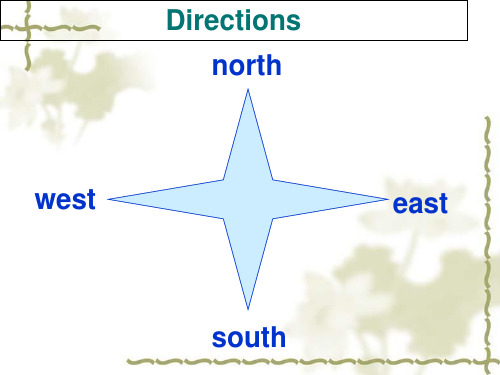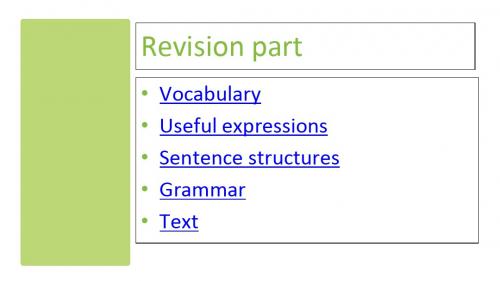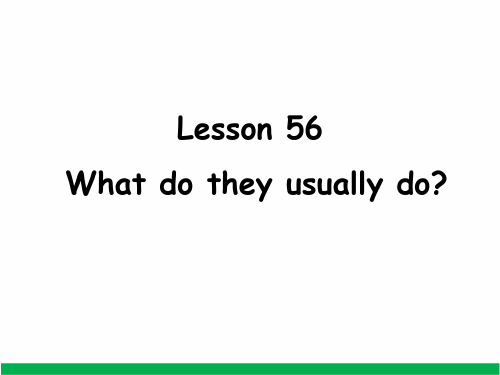新概念英语第一册第56课课件.ppt
合集下载
Lesson56(课件)新概念英语第一册

nice [naɪs]
adj. 美好的
meet [miːt]
v. 遇见
Japanese [ˌdʒæpə'ni:z] 日本的;日本人
Korean [kə'riən] 韩国的;韩国人
Chinese [tʃaɪniːz] 中国的;中国人
too
[tuː] adv. 也
PPT模板下载:/moban/ 节日PPT模板:/jieri/ PPT背景图片:/beijing/ 优秀PPT下载:/xiazai/ Word教程: /word/ 资料下载:/ziliao/ 范文下载:/fanwen/ 教案下载:/jiaoan/ 字体下载:/ziti/
行业PPT模板:/hangye/ PPT素材下载:/sucai/ PPT图表下载:/tubiao/ PPT教程: /powerpoint/ Excel教程:/excel/ PPT课件下载:/kejian/ 试卷下载:/shiti/
Thank
you!
PPT模板下载:/moban/ 节日PPT模板:/jieri/ PPT背景图片:/beijing/ 优秀PPT下载:/xiazai/ Word教程: /word/ 资料下载:/ziliao/ 范文下载:/fanwen/ 教案下载:/jiaoan/ 字体下载:/ziti/
行业PPT模板:/hangye/ PPT素材下载:/sucai/ PPT图表下载:/tubiao/ PPT教程: /powerpoint/ Excel教程:/excel/ PPT课件下载:/kejian/ 试卷下载:/shiti/
Mr. [‘mistə]
先生
Miss [mɪs]
小姐
Good [gʊd]
Listen to the tape and do the exercises
新概念英语第一册55-56-PPT课件

What do they usually do?
In the morning...... At noon...... In the afternoon...... In the evening...... At night......
Homework
Talk about your family
breakfast supper/dinner
The eating habits of Americans
美国人的饮食习惯
Breakfast
Breakfast time, the general in 8:00 They always eat baked bread, cereal and coffee,
3. At noon, who always eats lunch at home? Mr. or Mrs. Sawyer?
Mrs. Sawyer.
4. In the afternoon, what does Mrs. Sawyer usually do? What do they often do? She usually sees her friends. They often drink tea together.
到达……( 大地方) 到达……(小地方)
My father will arrive __i_n_ London tomorrow. I often arrive __/__home early in the evening.
Let’s read and remember the new words:
his wife watch television.
do one's homework 做作业
新概念英语第一册第55-56课件(共25张PPT)

要加-s
表述客观规律或事实用一般现在时
The plane can fly in the sky. The earth goes around the sun. The book is yellow. He is tall. He is very smart! She is very beautiful!
谢谢观赏
You made my day!
我们,还在路上……
What do you usually do in the weekend? in your vacation?
Do some exercises: 1. ( c ) I often _____ up at 7:oo in the morning. My mother often
_____up at 6:30. A. get, get B. gets, gets C. get, gets D. gets, get 2. (B )Jim’s brother ____ in a factory. He usually _____ to work by car. A. work, go B. works, goes C. works, go D. work, goes 3. (A) ____ you always ____ basketball on Sundays? A. Do, play B. Does, play C. Are, playing D. Are, play 4. (D) _____ your father often____ TV in the evening?
Does she often do her homework at night?
Lesson 56 What do they usually do?
表述客观规律或事实用一般现在时
The plane can fly in the sky. The earth goes around the sun. The book is yellow. He is tall. He is very smart! She is very beautiful!
谢谢观赏
You made my day!
我们,还在路上……
What do you usually do in the weekend? in your vacation?
Do some exercises: 1. ( c ) I often _____ up at 7:oo in the morning. My mother often
_____up at 6:30. A. get, get B. gets, gets C. get, gets D. gets, get 2. (B )Jim’s brother ____ in a factory. He usually _____ to work by car. A. work, go B. works, goes C. works, go D. work, goes 3. (A) ____ you always ____ basketball on Sundays? A. Do, play B. Does, play C. Are, playing D. Are, play 4. (D) _____ your father often____ TV in the evening?
Does she often do her homework at night?
Lesson 56 What do they usually do?
新概念一册L55-L56课课件

usually adv. 通常
频率副词:指经常发生的习惯性的动作,与一般现在时连用 always总是 usually通常 often经常 sometimes有时 never从不
eg:你下午经常干什么?我经常玩电脑 -What do you usually do in the afternoon? -I usually play computer.
Mrs. Sawyer stays at home every day. She does the housework.
1.the Sawyers是指索耶一家人,在英文中,姓氏后面加-s,前面加定冠词the,用来指一家人 2.live at…住在…(后接小的地点)live in…住在…(大地点) 3.in the morning在上午 in the afternoon/ evening在下午/晚上 at noon在中午 at night在晚上 4.go to work 去上班 go to school去上学 5.take sb.(某人)to sp.(某地)---这里的sb.用人称代词宾格(me/us/you/him/her/it/them) 6.stay at home待在家 7.do the housework做家务
At night, the children always do their homework. Then they go to bed. Mr. Sawyer usually reads his newspaper, but sometimes he and his wife watch television.
hometown家乡 homework家庭作业
housework n.家务(不可数名词)
• do the housework 做家务 • eg:我妈妈每天做家务。
新概念英语第一册第56课件ppt

What make is it?
• 这句话中的make是名词词性,意思是 产品牌号。 所以这句话的意思是:它是什么牌子 的? 回答:It's a...
• 这句话中的it是代词,这个位置也可以 用其他的名词 例如:What make is this pen?
为深入学习习近平新时代中国特色社 会主义 思想和 党的十 九大精 神,贯彻 全国教 育大会 精神,充 分发挥 中小学 图书室 育人功 能
作业
• 背诵第五课课文,并继续熟练第一课 和第三课的背诵。
• 听写单词。 • 熟练运用本节课所讲解的日常用语。
• suit
n.
school
n.
• teacher
n.
• son
n.
daughter n.
•伞 •请 • 这里 •票 • 号码 • 对不起的 • 先生 • 衣帽间 • 一套衣服 • 学校 • 老师 • 儿子 • 女儿
为深入学习习近平新时代中国特色社 会主义 思想和 党的十 九大精 神,贯彻 全国教 育大会 精神,充 分发挥 中小学 图书室 育人功 能
• ③ adj. 使人高兴的,令人愉快的 It is so nice to have you here.
为深入学习习近平新时代中国特色社 会主义 思想和 党的十 九大精 神,贯彻 全国教 育大会 精神,充 分发挥 中小学 图书室 育人功 能
Nice to meet you!
• 在初次见面时可以说这句话,回答是: Nice to meet you,too.
选择疑问句
• 在两者或三者中进行选择,在一般疑 问句后用or进行连接。
• 选择疑问句词调一般是前升后降。 • 回答必须要用完整的句子回答。
例如:-Is she a teacher or a worker?
• 这句话中的make是名词词性,意思是 产品牌号。 所以这句话的意思是:它是什么牌子 的? 回答:It's a...
• 这句话中的it是代词,这个位置也可以 用其他的名词 例如:What make is this pen?
为深入学习习近平新时代中国特色社 会主义 思想和 党的十 九大精 神,贯彻 全国教 育大会 精神,充 分发挥 中小学 图书室 育人功 能
作业
• 背诵第五课课文,并继续熟练第一课 和第三课的背诵。
• 听写单词。 • 熟练运用本节课所讲解的日常用语。
• suit
n.
school
n.
• teacher
n.
• son
n.
daughter n.
•伞 •请 • 这里 •票 • 号码 • 对不起的 • 先生 • 衣帽间 • 一套衣服 • 学校 • 老师 • 儿子 • 女儿
为深入学习习近平新时代中国特色社 会主义 思想和 党的十 九大精 神,贯彻 全国教 育大会 精神,充 分发挥 中小学 图书室 育人功 能
• ③ adj. 使人高兴的,令人愉快的 It is so nice to have you here.
为深入学习习近平新时代中国特色社 会主义 思想和 党的十 九大精 神,贯彻 全国教 育大会 精神,充 分发挥 中小学 图书室 育人功 能
Nice to meet you!
• 在初次见面时可以说这句话,回答是: Nice to meet you,too.
选择疑问句
• 在两者或三者中进行选择,在一般疑 问句后用or进行连接。
• 选择疑问句词调一般是前升后降。 • 回答必须要用完整的句子回答。
例如:-Is she a teacher or a worker?
新概念第一册第55-56课课件PPT课件

comes home from work, arrives home late
At night
the children Mr. Sawyer
do their homework, go to bed reads his newspaper
Mr. Sawyer and
watch television
his wife 第22页/共28页
第21页/共28页
When In the morning
Who
Mr. Sawyer
the children
Mrs. Sawyer
At noon
In the afternoon
Mrs. Sawyer Mrs. Sawyer
In the evening
the children Mr. Sawyer
What
第12页/共28页
• ①stop-stops [s] ; make-makes [s] • ②read-reads [z] ; play-plays [z] • 1.大多数动词在词尾加“s”在清辅音后发音为[s],在浊辅音及元音后发音为 [z]。
第13页/共28页
• fly-flies [iz]; carry-carries [iz] • study-studies [iz]; worry-worries [iz] • 2、以辅音字母加“y”结尾的,要先将“y”变为“i”,然后再加“es”读[iz]
➢频率副词 often, usually, sometimes, always
第18页/共28页
主谓结构
主语不是单三: 主语+实义动词原形
主语是第三人称单数:
主语+实义动词单三形式
1.一般动词末尾直接加-s
At night
the children Mr. Sawyer
do their homework, go to bed reads his newspaper
Mr. Sawyer and
watch television
his wife 第22页/共28页
第21页/共28页
When In the morning
Who
Mr. Sawyer
the children
Mrs. Sawyer
At noon
In the afternoon
Mrs. Sawyer Mrs. Sawyer
In the evening
the children Mr. Sawyer
What
第12页/共28页
• ①stop-stops [s] ; make-makes [s] • ②read-reads [z] ; play-plays [z] • 1.大多数动词在词尾加“s”在清辅音后发音为[s],在浊辅音及元音后发音为 [z]。
第13页/共28页
• fly-flies [iz]; carry-carries [iz] • study-studies [iz]; worry-worries [iz] • 2、以辅音字母加“y”结尾的,要先将“y”变为“i”,然后再加“es”读[iz]
➢频率副词 often, usually, sometimes, always
第18页/共28页
主谓结构
主语不是单三: 主语+实义动词原形
主语是第三人称单数:
主语+实义动词单三形式
1.一般动词末尾直接加-s
2019教育新概念英语第一册Lesson56(72张PPT)数学

Is this your umbrella?
No, it isn’t.
Is this it?
Yes, it is. Thank you very much.
New Concept English 1
Lesson5 Nice to meet you.
New words – Lesson 5
• 1 Mr. ['mistə] 先生 • 2 good [gud] a.好 • 3 morning ['mɔ:niŋ] n.早晨 • 4 Miss [mis] 小姐 • 5 new [nju:] a.新的 • 6 student ['stju:dənt] n.学生 • 7 French [frentʃ] a.& n.法国人
name is Jack.
My coat and my umbrella please.
Here is my ticket.
Thank you, sir. Number five.
Here is your umbrella and your coat.
Sorry, sir.
This is not my umbrella.
• Now can you introduce your family ? • Family members. • Introduce one member who you like most.
Revision one Vocabulary
• Here is the example. • He is my father. • He is a farmer. • His hobby is cooking. • Every morning, he cooks porridge for
Lesson56Whatdotheyusuallydo?(课件)新概念英语第一册

5. Do you always go to bed early? Yes, I do. No, I don’t. I always go to bed late.
6. When do you do your homework? I often do my homework in the evening.
A: Look at the 2nd picture.
What do they usually do
in the evening?
B: They usually watch television in the evening.
一般现在时的时间状语
in the morning in the afternoon in the evening at noon at night every day
早上 下午 傍晚 中午 晚上 每天
一般现在时的相关副词
always
总是,一直
usually
通常
often sometimes
经常,常常 有时
一般现在时: 主语 + (频率副词)+v.原形/v. 单三 + 时间状语
1
2
She often
3 makes the bed
4 every day.
He
alwaysБайду номын сангаас
Ask and answer in pairs. A: Does she often dust the cupboard? B: Yes, she does. She often dusts the cupboard.
A: Do they often dust the cupboard? B: Yes, they do. They often dust the cupboard.
6. When do you do your homework? I often do my homework in the evening.
A: Look at the 2nd picture.
What do they usually do
in the evening?
B: They usually watch television in the evening.
一般现在时的时间状语
in the morning in the afternoon in the evening at noon at night every day
早上 下午 傍晚 中午 晚上 每天
一般现在时的相关副词
always
总是,一直
usually
通常
often sometimes
经常,常常 有时
一般现在时: 主语 + (频率副词)+v.原形/v. 单三 + 时间状语
1
2
She often
3 makes the bed
4 every day.
He
alwaysБайду номын сангаас
Ask and answer in pairs. A: Does she often dust the cupboard? B: Yes, she does. She often dusts the cupboard.
A: Do they often dust the cupboard? B: Yes, they do. They often dust the cupboard.
- 1、下载文档前请自行甄别文档内容的完整性,平台不提供额外的编辑、内容补充、找答案等附加服务。
- 2、"仅部分预览"的文档,不可在线预览部分如存在完整性等问题,可反馈申请退款(可完整预览的文档不适用该条件!)。
- 3、如文档侵犯您的权益,请联系客服反馈,我们会尽快为您处理(人工客服工作时间:9:00-18:30)。
瑞典的 法国的
德国的 日本的
韩国的 英国的
美国的 意大利的
如何询问汽车的品牌呢?
• What make is the car ? • It’s a German car .
• What make is his / her / your car ? • It’s an American car .
• nice
adj.
美好的
• meet
v.
遇见
• Japanese adj.&n. 日本人
• Korean adj.&n. 韩国人
• Chinese adj&n. 中国人
• too
adv.
也
如何表明国籍呢?
• I am French/German/Japanese/Korean.
• He/She is Chinese/Japanese/German.
NAOKO:
Nice to meet you.
MR. BLAKE: And this is Chang-woo. He's Korean.
CHANG-WOO:Nice to meet you.
MR. BLAKE: And this is Luming. He is Chinese.
LUMNቤተ መጻሕፍቲ ባይዱ:
Nice to meet you.
New Concept EnglishⅠ First Things Frist
Zoe
Everyday English
1.Follow me! 跟我来!/跟着我!
2. Take it easy. 放松点!/慢慢来!
3. Have a try! 试一下!
英语音标(一)
• [i:] me • [i] excuse is this it • [e] yes • [æ] handbag thank • [a:] pardon • [Λ] much
“这位是索菲娅·杜邦小姐。” This is+姓名是将某人介绍给他人时常 用的句式。
Miss 小姐 一般用于指未婚女子,不过有时在不知 道对方是否已婚时也可使用
Sophie is a new student .
She is French
a 一个,一辆 ,一只… 例如 a car
表示一个还可以用 an,例如 an apple
it’s = it is it’s 是 it is 的缩写形式
And this is Luming. He’s Chinese .
“Nice to meet you .”
And this is Xiaohui . She’s Chinese , too .
“Nice to meet you .”
一. Listen to the tape ,then answer this
question “Is Chang-woo Chinese?”
MR. BLAKE: Good morning.
STUDENTS: Good morning, Mr. Blake.
MR. BLAKE: This is Miss Sophie Dupont.
Sophie is a new student. She is French.
MR. BLAKE: Sophie, this is Hans. He is German.
HANS:
Nice to meet you.
MR. BLAKE: And this is Naoko. She's Japanese.
Nice to meet you .
Nice to meet you.nice 美好的 ;meet 遇见 很高兴见到你。
用于初次与他人见面等非正式场合。对方的回应一般应为: Nice to meet you,too(我也很高兴见到你)。
人们在正式的场合初次见面时常用: How do you do? 相应的回答也是:How do you do? 这是一句问候语,并非问话。
And this is Naoko. She is Japanese. “Nice to meet you .”
And this is Chang-woo. He’s Korean.
“Nice to meet you .”
he’s = he is he’s 是 he is 的缩写形式
she’s = she is she’s 是 she is 的缩写形式
MR. BLAKE: And this is Xiaohui. She's Chinese, too.
XIAOHUI:
Nice to meet you.
Good morning !
Good morning , Mr. Blake .
Good morning 早上好
英语中常见的问候语.对此的回应也是Good morning
还有, Good afternoon(下午好), Good evening(晚上好) Good night(晚安)
Mr. 先生 Mr.用于男士的姓之前,不能单独 使用,如课文中的 Mr.Blake;而 sir 一般单独使用,是对长者、上司 或男顾客的尊称,如:Sorry, sir. 对不起,先生。
This is Miss Sophie Dupont .
英语音标(二)
• / ɔ /或 / ɒ / sorry watch
• / ɔ:/ • /u/
daughter book cloakroom
圆唇音
• / u: /
school suit
• / ә: /或/ɜ:/ shirt skirt sir
• /ә/
umbrella here number
teacher
• Is this your … ?
Lesson 5 Nice to meet you !
单词学习
• Mr.
先生
• Miss
小姐
• good adj. 好
• morning n. 早晨
• new
adj. 新的
• student n. 学生
• French adj.&n. 法国人
• German adj.&n. 德国人
a 与 an 在英语被称为不定冠词,二者在意义上没 有区别,但是,在发音以辅音音素开头的词前用a; 在发音以元音音素开头的词前用an。
主格代词顺口溜: 我是I ,你是You ; 男他He ,女她She ,动物的它是 It;
Sophie , This is Hans
He
.
is German.
见到你很高兴!
